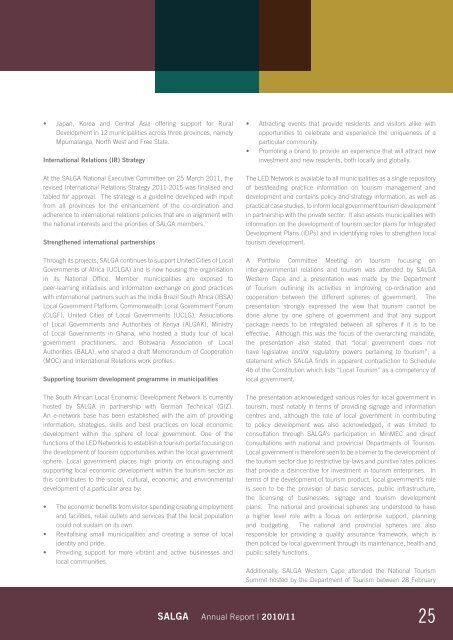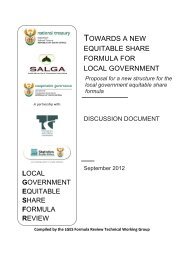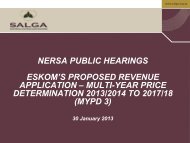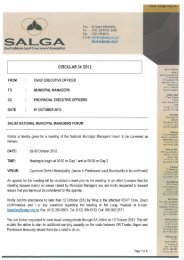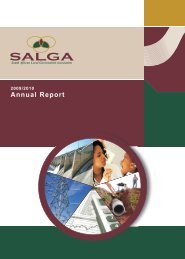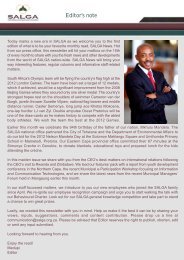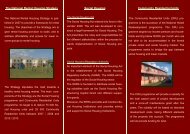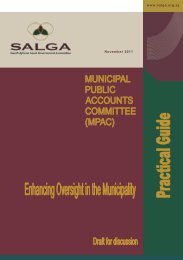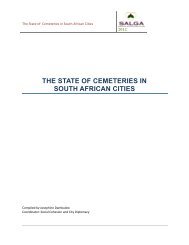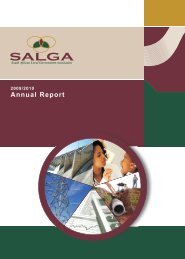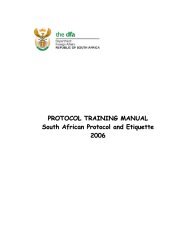Download - SALGA
Download - SALGA
Download - SALGA
- No tags were found...
You also want an ePaper? Increase the reach of your titles
YUMPU automatically turns print PDFs into web optimized ePapers that Google loves.
• Japan, Korea and Central Asia offering support for Rural<br />
Development in 12 municipalities across three provinces, namely<br />
Mpumalanga, North West and Free State.<br />
International Relations (IR) Strategy<br />
At the <strong>SALGA</strong> National Executive Committee on 25 March 2011, the<br />
revised International Relations Strategy 2011-2015 was finalised and<br />
tabled for approval. The strategy is a guideline developed with input<br />
from all provinces for the enhancement of the co-ordination and<br />
adherence to international relations policies that are in alignment with<br />
the national interests and the priorities of <strong>SALGA</strong> members.<br />
Strengthened international partnerships<br />
Through its projects, <strong>SALGA</strong> continues to support United Cities of Local<br />
Governments of Africa (UCLGA) and is now housing the organisation<br />
in its National Office. Member municipalities are exposed to<br />
peer-learning initiatives and information exchange on good practices<br />
with international partners such as the India Brazil South Africa (IBSA)<br />
Local Government Platform, Commonwealth Local Government Forum<br />
(CLGF), United Cities of Local Governments (UCLG), Associations<br />
of Local Governments and Authorities of Kenya (ALGAK), Ministry<br />
of Local Governments in Ghana, who hosted a study tour of local<br />
government practitioners, and Botswana Association of Local<br />
Authorities (BALA), who shared a draft Memorandum of Cooperation<br />
(MOC) and International Relations work profiles.<br />
Supporting tourism development programme in municipalities<br />
The South African Local Economic Development Network is currently<br />
hosted by <strong>SALGA</strong> in partnership with German Technical (GIZ).<br />
An e-network base has been established with the aim of providing<br />
information, strategies, skills and best practices on local economic<br />
development within the sphere of local government. One of the<br />
functions of the LED Network is to establish a tourism portal focusing on<br />
the development of tourism opportunities within the local government<br />
sphere. Local government places high priority on encouraging and<br />
supporting local economic development within the tourism sector as<br />
this contributes to the social, cultural, economic and environmental<br />
development of a particular area by:<br />
• The economic benefits from visitor-spending creating employment<br />
and facilities, retail outlets and services that the local population<br />
could not sustain on its own.<br />
• Revitalising small municipalities and creating a sense of local<br />
identity and pride.<br />
• Providing support for more vibrant and active businesses and<br />
local communities.<br />
• Attracting events that provide residents and visitors alike with<br />
opportunities to celebrate and experience the uniqueness of a<br />
particular community.<br />
• Promoting a brand to provide an experience that will attract new<br />
investment and new residents, both locally and globally.<br />
The LED Network is available to all municipalities as a single repository<br />
of best/leading practice information on tourism management and<br />
development and contains policy and strategy information, as well as<br />
practical case studies, to inform local government tourism development<br />
in partnership with the private sector. It also assists municipalities with<br />
information on the development of tourism sector plans for Integrated<br />
Development Plans (IDPs) and in identifying roles to strengthen local<br />
tourism development.<br />
A Portfolio Committee Meeting on tourism focusing on<br />
inter-governmental relations and tourism was attended by <strong>SALGA</strong><br />
Western Cape and a presentation was made by the Department<br />
of Tourism outlining its activities in improving co-ordination and<br />
cooperation between the different spheres of government. The<br />
presentation strongly expressed the view that tourism cannot be<br />
done alone by one sphere of government and that any support<br />
package needs to be integrated between all spheres if it is to be<br />
effective. Although this was the focus of the overarching mandate,<br />
the presentation also stated that “local government does not<br />
have legislative and/or regulatory powers pertaining to tourism”, a<br />
statement which <strong>SALGA</strong> finds in apparent contradiction to Schedule<br />
4b of the Constitution which lists “Local Tourism” as a competency of<br />
local government.<br />
The presentation acknowledged various roles for local government in<br />
tourism, most notably in terms of providing signage and information<br />
centres and, although the role of local government in contributing<br />
to policy development was also acknowledged, it was limited to<br />
consultation through <strong>SALGA</strong>’s participation in MinMEC and direct<br />
consultations with national and provincial Departments of Tourism.<br />
Local government is therefore seen to be a barrier to the development of<br />
the tourism sector due to restrictive by-laws and punitive rates policies<br />
that provide a disincentive for investment in tourism enterprises. In<br />
terms of the development of tourism product, local government’s role<br />
is seen to be the provision of basic services, public infrastructure,<br />
the licensing of businesses, signage and tourism development<br />
plans. The national and provincial spheres are understood to have<br />
a higher level role with a focus on enterprise support, planning<br />
and budgeting. The national and provincial spheres are also<br />
responsible for providing a quality assurance framework, which is<br />
then policed by local government through its maintenance, health and<br />
public safety functions.<br />
Additionally, <strong>SALGA</strong> Western Cape attended the National Tourism<br />
Summit hosted by the Department of Tourism between 28 February<br />
<strong>SALGA</strong> Annual Report | 2010/11<br />
25


